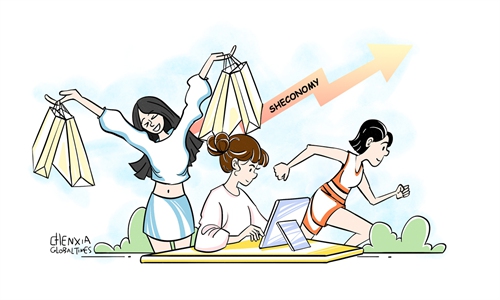ARTS / CULTURE & LEISURE
Free-handed or tight-fisted? Youngsters spark new consumption trend

File photo
The way young people spend money nowadays is intriguing.They won't pay two yuan (28 cents) for tissue in a restaurant, but they may spend more than 2,000 yuan on a concert ticket. On their way home, they walk to save 20 yuan in taxi fares but will still spend over 100 yuan on flowers, bread, and fruit. They are enthusiastic about cheaper substitutes, refusing to pay for brand and marketing premiums, but spend lavishly on things that catch their interest.
According to the Youth Consumption Survey released by DT Business Observation, 49.3 percent of surveyed youth spend more in specific categories because the product or service has emotional value.
The rise of self-pleasing consumption marks the emergence of a self-oriented lifestyle. Under such circumstances, Generation Z, the representative of the lifestyle, is shifting its consumption from paying for what others value to what they value, creating new forms of consumption. What are the characteristics of these youngsters' spending?
On the one hand, Gen Z prioritizes making themselves happy when they manage mental accounting.
Self-pleasing consumption focuses on individual identity, that is, what kind of people they are, how to make themselves happy, and how to promote their development; it also reflects their social identity and community.
They recognize brands that focus on their unique needs and hobbies. They show their values and influence by interacting with these brands.
Therefore, through consumption, Gen Z consumers bring joy to themselves, present their personality and unique lifestyle, develop and improve themselves, and make like-minded friends with whom they can create and build a better world together.
The Youth Consumption Survey shows over 60 percent of consumers greatly value spiritual consumption. From iiMedia's Research Report on the Development of China's Concert Industry in 2023-24, young people have become the leading consumer force in the Chinese performance market.
According to the latest data from the China Performance Industry Association, the proportion of ticket buyers aged 18 to 34 has exceeded 76 percent for three consecutive years. The proportion of ticket buyers under 24 was only 15 percent in 2019, but reached 35 percent in the first half of 2023.
On the other hand, they are down to earth and concerned about all-round values. Due to the impact of the global financial crisis and pandemic, Gen Z is more pragmatic and plans for the future, focusing on economic stability.
According to the 2023 Generation Z Double Eleven Consumer Behavior Report released by the Just So Soul Research Institute, 78.9 percent of young people set a budget, and only 15.9 percent exceeded their budget during the Double Eleven shopping festival.
In addition, Gen Z cares about the comprehensive value of goods, not just the symbolic aspect. First comes quality. They tend to choose durable goods sold at fair prices. Second is social value. They prefer brands linked to social responsibility and employee welfare.
Moreover, goods with concepts that resonate with them will be favored. The third goes to personalized needs. Gen Z consumers are willing to participate in shaping a brand by interacting with providers that match their values.
Regarding functional items, youngsters show relatively downgraded consumption and pursue ultimate cost-effectiveness; however, they tend to upgrade their spending when it comes to satisfying their emotional, social, and self-improvement needs.
This generation upholds their independent and firm beliefs. In 1983, A PARCO Group magazine proposed the concept of "creators beyond consumers," referring to people who spend money to make their way in life. They are more active and creative.
Each generation's life journey and personality traits are closely related to their social and historical environment. Growing up in an era featuring the prevalence of mobile devices and rapid promotion of internet technology and social media, Gen Z's inter-generational characteristics are increasingly evident.
The youngster's consumption concept is an interweaving of rationality and sensibility. Notably, young people should consume within their capacity. For example, they should be alert to the lending services provided by some financial platforms, which can easily trap young people into consumerism and ultimately make them unable to repay their debts. Moderately self-pleasing and rational consumption is likely a sound way of spending.
The author is a faculty member with the School of Applied Economics, Renmin University of China. life@globaltimes.com.cn



